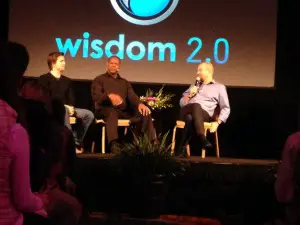The Wisdom 2.0 Bottom Line
March 2, 2015
I spent the last few days at the annual Wisdom 2.0 conference in San Francisco.

Michael Gervais, (left) George Mumford and Mike Robbins (right) discuss sports and psychology and the Wisdom 2.0 conference in San Francisco February 28, 2015,
Many of you have probably never heard of the event, so a little context is probably in order.
Attendance this year reached 2500 and could have gone higher if organizers had not capped it. The conference is designed as a combination celebration and support group for anyone trying to bring more: (pick one) consciousness, gratitude, or mindfulness to technology and business.
Attendees come from all over the world, although a large percentage are from California, to hear a variety of speakers from CEO’s to human resource managers, explain how they have tried to humanize their companies and deal with the increasing demands of the ‘always on’ world.
Using mindful meditation, exhortations to be present, and a wide variety of what many might consider alternative techniques, the conference is in direct contrast to the prevailing view of corporate America as a ruthless, cut throat, bottom line, profit driven culture.
In addition to the conference presentations on everything from neuroscience to networking, there are rooms devoted to meditation, and yoga, as well as a trade show in the Inspiration Lounge.
Many sessions focus on how to live a more fulfilling and compassionate life and to make choices that leave you happier both personally and in your career.
Here you can also find the latest in relaxation and stress reduction equipment and techniques.
While you might think the principles were some import from Europe, most of the foreign attendees, are quick to note that the techniques are uniquely American, which is what draws them here.
Companies with representative include LinkedIn, Facebook, Twitter, Google, Gap and a host of others who say that recent studies have shown conclusively that promoting mindfulness and self realization in their workforce actually adds to their bottom line in quantifiable manner.
In reality the conference is a large networking event, where like-minded folks can get together to reinforce their beliefs in hopes of connecting with someone who can help them move forward in their career.
A large percentage of the attendees are personal/executive coaches or management consultants, who are looking to make connections with those HR types from Google, Twitter, Facebook and GAP, to improve workplace performance. Admittedly the chances are slim, but you never know.
In two days I collected a raft of business cards, and spoke with lawyers, coaches, HR managers and some old friends from the spa and yoga worlds.
My wife, who is a clinical psychologist, and attended the first Wisdom conference 6 years ago, may be a more typical participant, but she was ill over the weekend and insisted I attend.
I’ll admit I was hesitant, but after three days I was pleasantly surprised and happy I made the effort. More on some of the things I learned will come in subsequent posts.
When organizers at the opening session asked who, in the audience, was a first-time attendee, I raised my hand along with two-thirds of the crowd.
Sponsors were thrilled, saying it showed how the movement was attracting new members. But you have to think; what does it mean when attendees at previous sessions are not coming back in significant numbers?
If this were a business that had to rely on new customers for 66% of it’s profit each year, would you be optimistic?
Sun Valley Serenade
September 2, 2014
My wife and I closed another hotel this weekend.
Well, I guess the Sun Valley Lodge was going to shut down for 9-month renovation, whether we stayed or not, but we were among the last guests to see the Lodge in its current incarnation.
The 124-room, 78-year old symbol of high-end fun in the snow will be converted into a 96-room playground for the rich and famous.
The Lodge will renovate every room, except one, expanding them to accommodate fireplaces, and updated bathrooms which will include Jacuzzi tubs and modern amenities.
The truth is the renovation is long overdue. While the Lodge, which bills itself as America’s first destination ski resort, is the priciest in the Ketchum-Sun Valley area, it fares poorly when compared to many budget priced hotel rooms. Where rooms are larger, and bathroom space for two people often included double sinks.
The Lodge was built in 1935 by the Union Pacific Railroad and has only had three owners. It’s only relatively recently that the current owner Carol Holding, who owned Sinclair Oil with her late husband Earl, made the resort and the surrounding area into a year-round destination.
The Holdings also own a number of other five-star resort properties in the Western United States
Before Mr. Holding, began marketing the location to events such as the annual Allen and Co. technology and media conference, most of the private jets at the Blaine County airport, only came during ski season. Now it’s not unusual to see folks like Arnold Schwarzenegger, Mariel Hemmingway, or tech moguls wandering downtown Ketchum year round.
California’s former governor was there over the recent Labor Day weekend, with his current young honey, but that’s a story for another post.
For the last four months the Lodge has been the site of a major addition to accommodate a new spa and fitness center as well as several 4-bedroom apartment units designed for families or wedding parties.
You can find more details about the renovation at the Lodge website but you won’t be able to stay there until June of 2015 – just in time for the Allen and Company gathering.
A true sign of the year-round nature of the Lodge business, is the fact that they are closing for the what used to be high-season for The Valley ski industry.
Until next summer, you can stay at the Sun Valley Inn, the sister hotel barely 100 yards away, or at any of the many condominiums managed by the Lodge.
In general, locals are thrilled and seem genuinely happy that a new generation of the Holding family is taking an active interest in managing the mini-empire. Carol Holding, is in her 80’s, and has been largely a ceremonial leader since her husband died in 2013 but her son, Stephen, has apparently taken over and as the press release says, wants to guarantee another 75 years of ownership.
By the way, that lone room that will not be renovated? You guessed it – room 206, which hosted Ernest Hemingway and his lover in 1939, as ‘Papa’ finished “For Whom the Bell Tolls.” Current hotel employees say the room has never been fully renovated and includes the original claw-foot tub- and can still be rented – although the plumbing apparently clogs frequently.
But the isolated cabin, where Hemingway lived during his Sun Valley years, and where he died, is on private land and not open to the public.
If my wife and I probably win the lottery by next year- we’ll be able to afford the rates at the new Lodge, since the area is truly a beautiful destination any time of the year and we look forward to returning for the annual Sun Valley Wellness Festival next May.
We Need the Sounds of Silence
October 1, 2010
I always been a walker/hiker. No big deal, I like to walk in Hawaii, in Yosemite, around my own neighborhood, wherever… it’s a good way to meet people and see what’s going on. Just observing the world and listening to nature.
Since MP3 players, primarily iPods and their kin, became popular there seem to be a lot more folks walking around listening to music. I have no objection to music but it seems to me. if you’re hiking, or even jogging in a beautiful natural setting, listening to the birds would be pretty good music.
Not to mention how those little earbuds close you off to the world. They prevent even a pleasant ‘hello’ or ‘good morning.’ Maybe that’s the intention but chance encounters make life more interesting.
This week I finally found someone who agrees with me. Please listen, he knows what he’s talking about. He must, he’s speaking at a TED Talk.
Defining the Orwellian Generation Gap
September 28, 2010
I was recently in New York City to meet with a new client and unexpectedly got some new insights into the generation gap.
I was having lunch at a small SoHo restaurant where the tables are so close you can’t help but hear the discussion next to you. I listened for almost 20 minutes while 4, 30-something managers talked about marketing, social networking demographics, and user information to keep in touch with young customers and create an online community. I knew the terms but this was the first time I heard them used in polite conversation.
This was my first clue that there was a generation gap between our tables.
Finally I couldn’t help it, I excused myself for listening but asked if the group was at all concerned about privacy, noting the recent Verizon television ad which shows everyday objects morphing into antennas for the ‘always connected’ generation. I told them I found it creepy and didn’t ever want to be that ‘in touch.’
Their unanimous response – privacy is always part of the conversation but the younger generation thinks always being connected is the way things should be. They want everyone to know where they are and what they are doing all the time. As one young woman said, “our generation doesn’t want that, but the young people do.”
I thought I was talking to young people, but they were describing their generation gap.
I was worrying about George Orwell’s predictions and they were worried their company would be left behind because it wasn’t Orwellian enough.
I’m not sure what all this means. I thought i was pretty up to date with my Twitter account (eariess), blog, LinkedIn page, and text messaging but I guess the faster I go the further behind I get.
I do take some solace from the text messages I get from my 90-year-old father. I hope if I make it to his age I’ll at least be in touch with whatever the current generation is doing.
In case you’re wondering what I’m talking about you can find details at this Wall Street Journal Article.
Visiting the ‘Googleplex’
September 20, 2010
I was recently invited to Google. I’m helping to coordinate a career event they are hosting this January for my Alma Mater, Bucknell University.
 Like a lot of companies Google requires a non-disclosure agreement, so I can’t go into a long post about everything I saw, but I have to say it is a very unique place. You can’t help be impressed with the atmosphere.
Like a lot of companies Google requires a non-disclosure agreement, so I can’t go into a long post about everything I saw, but I have to say it is a very unique place. You can’t help be impressed with the atmosphere.
And yes, lunch was free. I couldn’t help but wonder if it would be a good place for experiments in whether people really do it more just because it’s available. I didn’t notice too many overweight employees. Must be the volleyball court, soccer filed , endless pools or workout rooms. Or possibly the Google bikes people use to ride between buildings.
After all, the Google campus is bigger than my college campus at least when I attended school.
E-Book Reading
September 15, 2010
I completed reading my first electronic book recently. (Review to come shortly) The only thing I can say is that reading a book on an iPad (or any other device) is, well, different.
Little things I’m used to doing, such as thumbing ahead to see how many pages are left in the chapter, are more difficult.
Highlighting text is easier, once you understand what the device or application wants. Reviewing all the highlighted material, to help write a review or for research, is certainly much easier.
I was worried that my eyes would get tired quicker but that proved not to be the case. Downloading the books has been easy although, not every service has every book, so it sometimes takes a bit of searching. Browsing the online bookstores is certainly not as pleasurable as strolling through my local bookshop. You have to know what you want electronically speaking, before you go start.
Using the iPad was easy enough although it can’t be used in every situation and I doubt I would take it to the beach. But I was able to take several books on a recent trip with little or no extra weight.
It will be a while before electronic books replace the printed word. There is still something more satisfying about holding a book in your hand, but I have already downloaded a few more and I’m sure, in time, iPad reading will become my regular habit.
It’s the Economy, Stupid
September 7, 2010
Been traveling over the last few weeks and while I continue to read stories about high unemployment and how it will give Republicans an edge in the Fall elections, I have to say, I just don’t see it.
The New York Times had a recent front page story claiming that even the hi-tech industry wasn’t hiring.
Maybe it’s my own version of cognitive dissonance – refusing to believe facts counter to you own beliefs – but I hear a different theme.
Every major firm in Silicon Valley has openings. Google’s stock has recently taken a hit, in part because they have added more people – too many according analysts. Yahoo, Intel, Apple and others are all looking for talented employees.
The problem seems to be they can’t find enough with the right skills so they are all trying to hiring the same folks. That’s not an employment problem it’s a skills/training issue.
I know a man who was unemployed in Silicon Valley for 18 months and recently found a job and has since had two other opportunities. That’s a far cry from what he’s been through.
Or take my friends in Hawaii, who don’t claim the economy has recovered, but say, it’s certainly better than last year.
Or take the woman in Boston who I ran into. She just started working after a 9-month forced vacation. She says the hotel in Cambridge that hired her has been booked solid since she started working in April.
Or take the man in New York who I met, who works three part time jobs and just lost one of them when a financial services firm closed. He’s able to collect unemployment so he’s counted in statistics but he’s not exactly desperate.
My unscientific survey of ‘Help Wanted’ signs in store windows shows a marked increase over last year. I’ve seen them in New York City, Boston, and San Francisco.
I’m not sure what all this proves except that, as I tell my clients, if you believe things are bad that will come through in your interviews and enthusiasm. But if you believe things are headed in the right direction despite the political rhetoric, you’ll have a much easier time finding something.
‘Weird’ Photography
February 18, 2010
Sometime in the next week you will notice that my website photo will change. It’s no big deal but hopefully I will stop hearing comments about my tie.
But, like everything else, there’s a lesson here.
To get the new photo I went to a local photographer. I just needed an image for the page but I never thought to ask about whether the photographer, Nan Phelps in Kensington, CA, used a digital camera.
She doesn’t . Nan uses a Mamiya C330 – a model I used as a photographer 30 years ago. What ensued was a lengthy conversation about whether she should switch, or at least offer customers a digital option.
“Photography is about the process,” she said, “I see it as art, and when I hear about other photographers spending hours digitally retouching photographs I cringe. I don’t mind being called weird, or old fashioned, I have a niche, I’m doing very well, and I meet many starving digital photographers, all stressing the need for a faster and faster turnaround. I just want to say stop.”
She was unmoved by my suggestions, insisting she didn’t care if the digital shutterbugs raced to the bottom offering lower prices.
“I don’t need to update my software or computer every 18 months, and I’m very proud of my work and don’t have to worry about whether an image I took with a digital camera might be one I want to enlarge but can’t.
It was a wonderful discussion and I have to admit she may have won me over. You can decide for yourself when the new portrait is posted, but just maybe, we’d all be a bit better off if we just slowed down.
I know there would be less stress and that could only be good. Thanks Nan.
Bedside books
January 27, 2010
If you’re like me you have a stack of unread books next to your bed. I never get to them because I take the newspaper with me and catch up before I head off to dreamland.
How much nicer would it be if my nightstand was clear except for a new new iPad which had all the books and the newspaper in one place. I know the Kindle could do the same thing but without the color and graphics. Watch for me in line when they go on sale next month.




